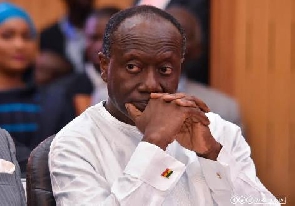 Ken Ofori-Atta, Finance Minister
Ken Ofori-Atta, Finance Minister
The Ministry of Finance says the Minority Caucus in Parliament’s criticisms of the Energy-sector Bond, issued by the ESLA PLC, smacks of “intellectual dishonesty” or “mischief”.
A statement issued by the Public Affairs Unit of the Ministry, and copied to the Ghana News Agency in Accra, on Thursday, said the Minority’s statement was fraught with various factual untruths deliberately spun to allow them to reach their own preferred conclusions.
It said the Minority either did not fully understand the assumptions underlying the Bond Structure, and thus, failed to do the Mathematics right or it was just being plainly malicious.
It explained the Minority’s claim that the seven-year Bond closed at GH¢1.5 billion was not accurate.
It said a published information by E.S.L.A. PLC indicated that the Bond was rather oversubscribed at GH¢2.53 billion, and the Bond issuer chose to accept GH¢2.4 billion at the cut-off interest rate of 19 per cent.
In addition, the statement said the claim that the 10-year bond was first closed at GH¢760 million was false because the Bids received in the first week alone amounted to GH¢872 million and not GH¢760 million as claimed by the Minority, saying this information was public and verifiable.
“The Minority claims the 10-year bond after extension closed at GH¢2.2 billion, again is false.”
Total bids received for the 10-year bond was GH¢2.79 billion of which E.S.L.A. PLC accepted GH¢2.29 billons at an interest rate of 19.5 per cent,” it emphasised.
It said in total, the E.S.L.A. PLC received bids of GHC 5.32 billion (GH¢2.53 billion for the 7-year and GH¢2.8 billion for the 10-year), representing 89% of the targeted amount of GH¢6 billion for the first tranche under the Bond Programme.
E.S.L.A. PLC chose to accept the total amount of GH¢ 4.70 billion out of a possible GH¢5.32 billion; representing 78% of the targeted amount as this was what it preferred within its target price range of 19%-19.5%, it said.
It explained that the Bond issuer made a decision based on a cost/yields consideration, which was prudent and not a failure.
“The Minority claimed that the projected consumption of petroleum products, used as a basis for projecting ESLA inflows was unrealistic. This was based on their assumption that monthly fuel consumption was equal through-out the year,” it said.
It explained that historical data on consumption patterns, however, proved that this was a flawed assumption since fuel consumption in the second half of the year was often higher as a result of increased economic activity and seasonal weather patterns.
It said the E.S.L.A. PLC’s projected consumption of petroleum products was accurate and conservative and remained in line with historical patterns.
“The Minority claim that E.S.L.A. PLC could not meet the Debt Service Coverage Ratio (DSCR) of 1.25% but rather scored 1.1% DSCR,” it said. “They arrived at the 1.1% by dividing the expected inflows from the Energy Debt Recovery Levy of GH¢1.281 billion by GH¢1.158 billion in total interest payments for both the 7-year and 10-year bonds (i.e. 1.281/1.158 = 1.1) “The Minority, however, did not recognise the addition of GH¢600 million Government of Ghana cash support (to be provided on demand) component, as stated in the prospectus, to the GH¢1.28 billion.
“They also did not add the starting cash of GH¢ 350 million in the Energy Debt Recovery Levy (EDRL) Account.
“It is instructive to note that the addition of the two missing components in the Minority’s assumptions, gives a total amount of approximately GH¢2.231 billion making the ratio now 1.926% (2.231/1.158). “This is far greater than the required 1.25% DSCR.”
The statement said it was unbelievable how the Minority would want the energy debts to be considered part of Government debt, when in 2016, the same NDC Government restructured about GH¢2 billion debt owed to commercial banks under ‘the VRA Phase One Restructuring Programme’ using ESLA proceeds as a payment source.
“If ‘VRA Phase One’ and TOR debt restructuring were deemed prudent at the time by the NDC, and treated as a non-sovereign transaction, why not the E.S.L.A. PLC’s Bonds?”
It, therefore, described the NDC Minority’s stand on the “Energy Bond as inconsistent and baffling.”
On Wednesday, the Minority Caucus in Parliament organised a press conference, saying the Government’s issuance of the Bond failed to achieve its targets because the process was fraught with irregularities.
It described the move as a total failure, which had caused financial loss to the State.